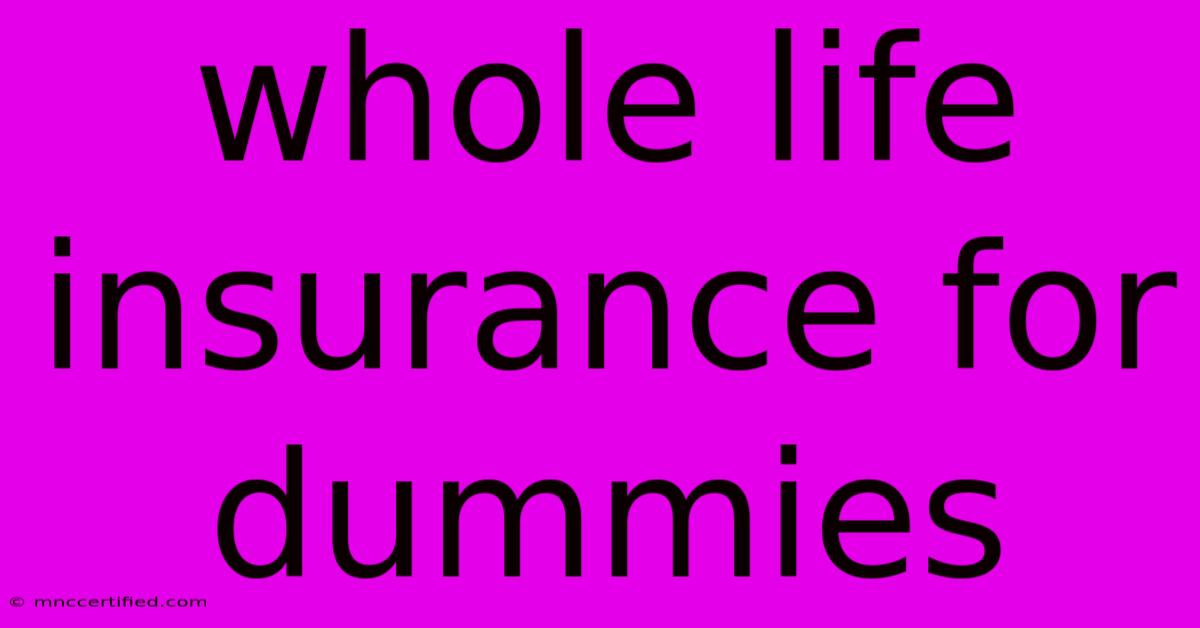Whole Life Insurance For Dummies

Table of Contents
Whole Life Insurance for Dummies: A Simple Guide
Whole life insurance can seem confusing, even intimidating. Terms like "cash value" and "guaranteed death benefit" might leave you scratching your head. But understanding whole life insurance doesn't have to be a struggle. This guide breaks down the basics, making it easy to grasp, even if you're a complete beginner.
What is Whole Life Insurance?
Unlike term life insurance, which covers you for a specific period (e.g., 10, 20, or 30 years), whole life insurance provides lifelong coverage, as long as you keep paying premiums. This means your beneficiaries receive a death benefit payout whenever you pass away, regardless of when that happens.
But that's not all. Whole life insurance also builds cash value, a tax-deferred savings component that grows over time. This cash value can be borrowed against or withdrawn, offering financial flexibility.
Key Features of Whole Life Insurance:
- Lifelong Coverage: The most significant feature is the guaranteed coverage for your entire life. This provides peace of mind knowing your loved ones are protected no matter what.
- Cash Value Accumulation: A portion of your premium goes towards building cash value, which grows at a fixed or variable rate depending on the policy type.
- Tax-Deferred Growth: The cash value grows tax-deferred, meaning you don't pay taxes on the earnings until you withdraw them.
- Guaranteed Death Benefit: The death benefit is guaranteed, meaning your beneficiaries will receive a pre-determined amount upon your death.
- Policy Loans: You can borrow against your cash value without affecting the death benefit. However, interest accrues on these loans.
Whole Life Insurance vs. Term Life Insurance: Which is Right for You?
The choice between whole life and term life insurance depends on your individual needs and financial goals.
Whole Life Insurance:
- Pros: Lifelong coverage, cash value accumulation, potential for long-term growth.
- Cons: Higher premiums than term life insurance, slower initial cash value growth.
Term Life Insurance:
- Pros: Lower premiums, simpler policy structure.
- Cons: Coverage expires after a set term, no cash value accumulation.
Consider whole life insurance if:
- You want lifelong coverage and a savings component.
- You prioritize long-term financial security for your family.
- You're comfortable paying higher premiums for the added benefits.
Consider term life insurance if:
- You need affordable coverage for a specific period.
- You primarily need a death benefit to protect your family during your working years.
- You prefer a simpler, less expensive insurance option.
Understanding Cash Value Growth:
The cash value in your whole life policy grows over time, typically through a combination of premium payments and investment earnings. The rate of growth depends on the type of policy (fixed or variable) and the insurance company's performance. It's crucial to understand the projected growth rates and associated fees before committing to a policy.
Choosing the Right Whole Life Insurance Policy:
Several factors influence the cost and features of a whole life insurance policy, including:
- Your age and health: Younger, healthier individuals typically qualify for lower premiums.
- The death benefit amount: A higher death benefit results in higher premiums.
- The type of policy: Fixed or variable whole life policies offer different growth potential and levels of risk.
- The insurance company: Different insurance companies offer varying premiums and policy features.
Finding a Whole Life Insurance Policy:
Shopping around and comparing quotes from multiple insurers is crucial to finding the best policy for your needs. Don't hesitate to consult with an independent insurance agent who can provide unbiased advice and help you navigate the complexities of whole life insurance.
Frequently Asked Questions (FAQs):
Q: Can I withdraw the cash value from my whole life insurance policy?
A: Yes, you can withdraw the cash value, but this will reduce the death benefit and potentially impact the policy's overall growth.
Q: What happens if I stop paying premiums on my whole life insurance policy?
A: Your policy will lapse, and you'll lose the coverage and cash value accumulation.
Q: Are there any tax implications associated with whole life insurance?
A: The cash value grows tax-deferred, but withdrawals and loans may have tax implications depending on the circumstances. Consult a tax professional for personalized advice.
This guide provides a basic understanding of whole life insurance. Remember to conduct thorough research and seek professional advice before making a decision. Choosing the right policy is a significant financial commitment, so careful consideration is essential.

Thank you for visiting our website wich cover about Whole Life Insurance For Dummies. We hope the information provided has been useful to you. Feel free to contact us if you have any questions or need further assistance. See you next time and dont miss to bookmark.
Featured Posts
-
Celebrity 2024 Confirmed Lineup
Nov 22, 2024
-
Invesco Chief Investment Officer
Nov 22, 2024
-
Reverend Richard Coles Faith And Music
Nov 22, 2024
-
San Diego Investment Real Estate
Nov 22, 2024
-
Dubai Industrial City 20 Years Of Growth
Nov 22, 2024